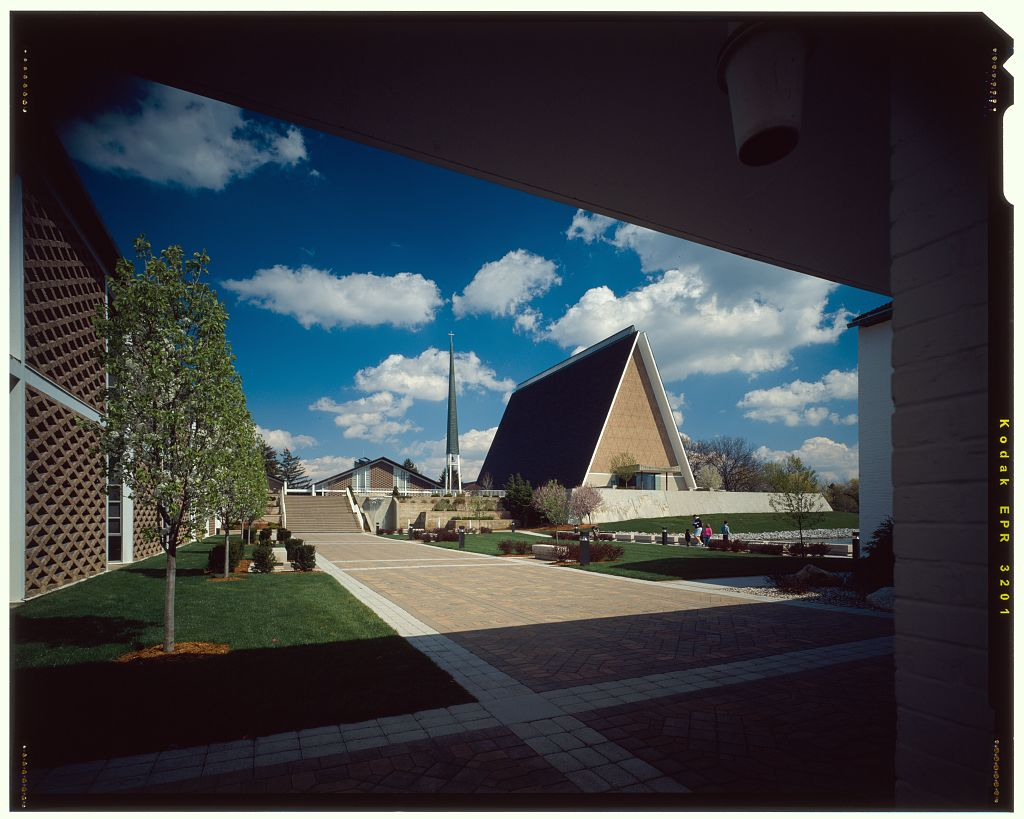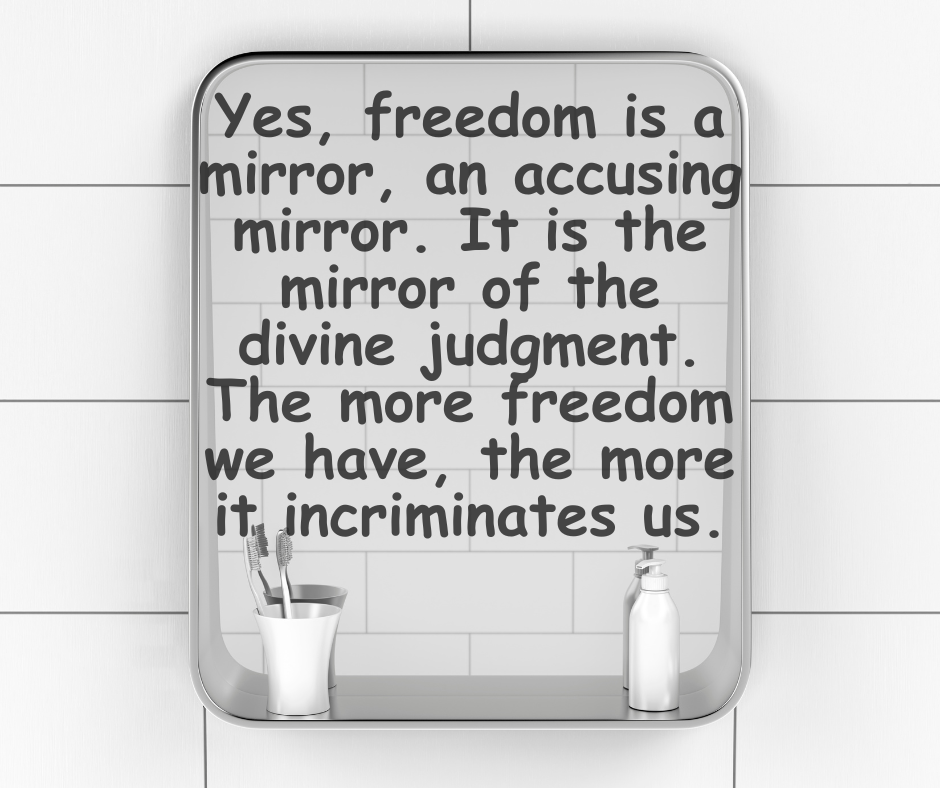Co-missioners,
Americans will celebrate the Fourth of July this weekend. We can’t think of a better time to send you a reflection on freedom by the late great Robert W. Bertram.

Concordia Theological Seminary (originally Concordia Senior College), Fort Wayne, Indiana, 1953-58
From Wikimedia
Bob took this topic up fifty-five years ago in an address to the graduating class of a late, great school, Concordia Senior College in Fort Wayne, Indiana. “The Fort,” as students called it, specialized in pre-ministerial education. It gathered seminary-bound students from Missouri Synod junior colleges around the country and grounded them for two years in liberal arts and Biblical languages. Most of them would proceed from there, B.A. in hand, to Concordia Seminary, St. Louis. That’s where Bob was teaching in 1968, the year of this address. As he delivered it, he was looking at a solid block of men. Two of the major U.S. Lutheran church bodies had women in the ministerial pipeline that year. The LCMS was not one of them. Aside from the librarian, there were no women on the otherwise outstanding Senior College faculty.
Bob entitled his address “The Twice-Free Student.” Or so we learned from editorial notes by Mike Hoy when we unearthed it from an old Crossings newsletter. One could speak as well of “The Twice-Free Citizen.” As you read, you’ll notice how Bob touches frequently on this topic too. We’ve taken the liberty here of adjusting his title accordingly.
Bob spoke at some length on that long-ago commencement day. Hence another in our recent string of multi-part postings, this one dispatched in a way that will bracket America’s pending Freedom Fest (as one might call it) with God’s two Words, Law on the one hand, Gospel on the other. Both are delivered with the clarity, richness, depth, and finesse that set Bob apart as a teacher of teachers.
Would that every American in 2023 had ears and hearts for the honest, vigorous freedom God wants us to enjoy. “Come, Holy Spirit!”
Peace and Joy,
The Crossings Community
___________________________________________________
The Twice Free Student—or Citizen
by Robert W. Bertram
There is freedom and there is freedom. There is freedom with a small f and freedom with a capital F. Both freedoms are yours. You are twice free. Of both freedoms we can say, though not in the same way, three things: freedom is a hard-bought thing, freedom is a responsibility, freedom is a mirror.
I. Freedom, small “f”
First, freedom (freedom with a small f) is a hard-bought thing. How hard is it for people to buy their freedom? I had a student who had come to us from the brave country of Hungary. He had been one of the Freedom Fighters who in those dark days on the streets of Budapest had fought a losing battle, with sticks and stones, against the Soviet tanks. And now for a while he had left behind the homeland, the beloved country, but only until that opportune day when he could return and rejoin the cause for freedom.
Freedom is a hard-bought thing. In 1776 when Richard Henry Lee stood before the Continental Congress and proposed that the colonies assert their independence from the fatherland he loved, he had already counted what this would cost in the bloodshed of his fellow Virginians. Moreover, his blood brother was still an alderman in London and his own two sons were away at school in England.
Freedom is a hard-bought thing, also for you as students. In its quieter agonies on every thinking campus throughout today’s world, the fight for student freedom is a costly one. You too must be experiencing, at first hand, how students can win their freedom at only a very high price.
For even such conventional freedoms as the freedom from compulsory class attendance, freedom to help shape the curriculum, freedom to choose your own seminary or your own pre-seminary college, freedom to raise a beard (you’ll notice I don’t have one myself), freedom to marry a wife, to own a car, to incur debts, just think of the exorbitant cost which even such freedoms entail: the cost in negotiations between students and administration, the cost in manhours in faculty curriculum committees—not to mention the higher cost of impatience, generations gap, misunderstanding, demoralization. Freedom is a hard-bought thing.
+ + +
Freedom is a responsibility. Liberty, as we Americans will again remind one another on the fourth of next month, is our “inalienable right.” But it is more than that. It is a responsibility. To be free is my obligation. I don’t mean only that freedom imposes responsibility. That is self-evident. What I mean is that people have a responsibility to be free. It is one of the ground rules of a democracy that no citizen may sell himself or herself into slavery. One thing people are not free to do: They are not free to forfeit their freedom. Not even by majority vote. The governments of Nazi Germany and Fascist Italy were both voted into power by sizable majorities in their popular elections. This did not make them free nations. Can a democratic people, by popular vote, repeal the popular vote? If so, what they repeal is not merely a right but a responsibility. Do we have a right to be free? We have no right not to be free.
Freedom is our responsibility. There are some things in life which I have to be left free to do myself and which neither you nor anyone may do for me. I have to do my own eating and drinking. I have to do my own dying. These you cannot do for me.
I have to do my own loving—loving my God, my fellow humans. You may love them, too, but that would be your love for them, not mine. You may not relieve me of that responsibility. I have to be free to do my own thinking. You may advise me, but it is I finally who must make my decisions if I am to be held responsible for them. I may be a member of an oppressed people—say, a disinherited American citizen or an overrun foreigner—and you may be willing to fight for my freedom. But you are not free to take my responsibility for me, my own responsibility to be free, free even from you. I am responsible for that freedom, responsible to Someone greater than both of us.
Freedom is your responsibility, also as students. Student freedom is not only your right. It is your duty, frankly, whether you desire it or not. Just which freedoms in particular you ought to have may be an open question. Such questions are still negotiable. But this much, now already, is sure: If as students you are being retarded, stunted, in your shouldering of your responsibilities, then to that extent you are not as free as you ought to be—as you ought to be, as you are obligated to be, not merely as you have a right to be.
For example, there may be daily roll-calls to check your class-attendance, pop quizzes to motivate your homework, a prescribed curriculum to protect you against your own bad choices, acres of real estate to insure your environment, a likeminded peer group all moving on the same vocational track, a synodical “system” providing you an eight-year planned society. Are these conditions debilitating? Not necessarily. They might even be liberating. But if these conditions were to disable you from accepting your own responsibilities—especially in view of the profession you are entering, which gives you more responsible freedom than any other profession does—and if conditions like these were still retarding your responsibility as seminarians in professional school, perhaps with wives and families of your own, then those conditions, to put it modestly, would be depriving you of a freedom you ought to have, a freedom you not merely have a right to have but are obligated to have. Freedom, also student freedom, is your responsibility.
+ + +
Freedom is a mirror. Freedom can show me up for what I am. Leave me free to face my responsibilities, and I have to face up to myself. The ten-year-old boy insists to his father, “At my age I should be free to start smoking.” His father reasons with him, but with no success. Finally he says to the boy, “All right, son, you’re free to try it.” When the boy does and, in the process, turns green and everything around him begins to spin, the boy has learned something about smoking, about ten-year-olds, about himself. His freedom was a mirror.
The prodigal son asked for his inheritance and for the freedom to set out on his own. Reluctantly his father gave him that freedom. Later, when the son sat penniless and defeated among the husks in the far country, he had made a discovery, “Father, I am not worthy to be called your son.”
Freedom is a mirror. When I insist on bearing my responsibilities, as indeed I must, I also have to bear the consequences and face the truth about myself—whoever I may be. I may be the American business community, free to take responsibility for the national “inheritance.” But suppose that in my freedom—though I’m never convinced I have enough of it—I nevertheless become prodigal and waste the nation’s substance, pollute its air and its water, give only token consideration to its unemployables, and exploit its consumers. Then my freedom, the freedom of American business, only mirrors my unworthiness to be free.
I may be The American Family, free to take responsibility for my family members. But suppose that in this freedom I mortgage myself to death on creature comfort yet begrudge the cost of my youngsters’ and other peoples’ youngsters’ education. Suppose what I show these youngsters of married life forever ruins their respect for it. Suppose I abandon their spiritual care to a Sunday School and their grandparents to loneliness and a little Medicare. Then my freedom, the freedom of the American family, only mirrors my unworthiness to be free.
I may be The American Student, liberated more and more from the old restrictions of curriculum and grading system and campus discipline, free more and more to take responsibility for my own education. But suppose that in my new freedom I flunk my courses or just squeak by with the barest minimum, find it increasingly difficult to get myself to classes anymore and increasingly tempting to blame my uninteresting teachers—as though I were really that dependent upon my teachers.
Worse yet, suppose that in my new freedom it suddenly becomes clear how little responsibility I accept for my delinquent fellow students, how little responsibility for getting them to class or helping them to excel, and how little responsibility we students all accept for our own mutual discipline and encouragement, as students.
Then see what the mirror of my student freedom reflects. It reflects not only that I’ve done poorly in a course, not only that I may have to spend an extra semester in seminary, not only that my financial aid will be reduced, not only that the once-in-a-lifetime opportunity to read this book or hear that lecture is forever forfeited, not only that the student brotherhood has been deprived of my help. No, the worst of it is, my student freedom then mirrors my unworthiness to be free.
Yes, freedom is a mirror, an accusing mirror. It is the mirror of the divine judgment. The more freedom we have, the more it incriminates us. But it’s the same even when people hesitate to trust us with freedom. Whether their distrust is justified or not, their restrictions upon us are implicit judgments upon us. And not only their judgments. Their judgments in turn mirror the judgment by God. And that his judgment is justified there can be no doubt.
That, finally, is why freedom is so costly. It costs us every last pretense about our own importance. It exacts from us the ultimate confession, that we cannot justify the freedom we have. No wonder so many among us, also so many students, cop out on the drive for freedom. It isn’t worth the effort, they alibi. But that isn’t all it isn’t worth, namely, the “effort.” Perhaps what they really mean is, it isn’t worth the painful truth which freedom uncovers about ourselves.
No wonder so many among us, also so many students who do stump for freedom, are those who kid themselves about their ability to handle it. They haven’t counted the real cost in self-honesty. Still, as we also said, we have no right to run away from our freedom, as mortifying as it finally is, and as it is meant to be. We have no right not to be free, no right to evade that ultimate exposure.
From that dilemma there is no buying our own way out. Freedom is a hard-bought thing, freedom is a responsibility, freedom is a mirror.
That, alas, is freedom with a small f.
…to be continued
Thursday Theology: that the benefits of Christ be put to use
A publication of the Crossings Community





You must be logged in to post a comment.